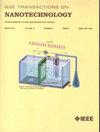用于乳腺癌检测的石墨烯-硅异质结 LED 的设计与评估
IF 2.1
4区 工程技术
Q3 ENGINEERING, ELECTRICAL & ELECTRONIC
引用次数: 0
摘要
乳腺癌对人类来说仍然是一种毁灭性的疾病,特别是由于其存活率低,尤其是在晚期发现并发生转移时。早期诊断是提高存活率的关键,但目前的诊断技术,如乳房 X 射线照相术和核磁共振成像,成本高昂,而且需要经验丰富的放射科医生来解读结果。透射照明是一种非侵入性诊断技术,利用光来检测乳房异常。LED 在透射照明中非常重要,因为照明模式可以显示乳腺组织的异常。石墨烯基材料为制造轻薄、柔韧、耐用的二维(2-D)发光源提供了一条前景广阔的途径。同时,石墨烯超高的载流子迁移率($\sim 15000 \frac\{text{cm}^{2}}{V \sec }$)和石墨烯/硅异质结 LED 的低带隙提高了此类 LED 的性能,从而降低了电阻、与传统的 GaAs ($\sim 4000 \frac\{text{cm}^{2}}{V \sec }$) 和 AlGaAs ($\sim 212 \frac\{text{cm}^{2}}{V \sec }$) LED 相比,石墨烯/硅异质结 LED 的电阻更低,电子-空穴重组得到改善,外部量子效率更高。因此,本研究探讨了石墨烯/硅异质结 LED 在乳腺癌诊断中的潜在用途。在690纳米波长下,石墨烯/硅异质结LED的响应率为285美元,而响应率分别为0.6美元和0.9美元。在 AlGaAs 和 GaAs LED 中分别得到了 {\rm{mu A}}{rm{W}}$ 和 $0.9\frac {\rm{mu A}}{rm{W}}$ 。本研究还利用所设计的 LED 研究了光穿透对乳腺组织的影响,包括随温度变化的吸收率。研究还发现,拟议 LED 的内部量子效率约为 37.5%,而 AlGaAs 和 GaAs LED 的内部量子效率分别为 24% 和 27%。因此,开发这种低成本、无辐射、高效的乳腺癌诊断光电设备可以显著提高生存率,尤其是在那些昂贵的诊断技术有限的发展中国家。本文章由计算机程序翻译,如有差异,请以英文原文为准。
Design and Evaluation of Graphene-Silicon Heterojunction LEDs for Breast Cancer Detection
Breast Cancer remains a devastating affliction for humanity, particularly due to its low survival rates, especially when detected at advanced stages and metastasis has occurred. Early diagnosis is crucial to increase survival rates, but current diagnostic techniques such as mammography and MRI are costly and require an experienced radiologist to interpret results. Transillumination is a non-invasive diagnostic technique that uses light to detect breast abnormalities. LEDs are important in transillumination as the illumination pattern can show abnormalities in breast tissues. Graphene-based materials offer a promising avenue for the creation of thin, flexible, and durable two-dimensional (2-D) light-emitting sources. At the same time, the exceptionally high carrier mobility of graphene (
$\sim 15000 \frac{\text{cm}^{2}}{V \sec }$ $\sim 4000 \frac{\text{cm}^{2}}{V \sec }$ $\sim 212 \frac{\text{cm}^{2}}{V \sec }$ $285 \frac{\rm mA}{\rm W}$ $0.6 \frac {\rm{\mu A}}{\rm{W}}$ $0.9\frac {\rm{\mu A}} {\rm{W}}$
求助全文
通过发布文献求助,成功后即可免费获取论文全文。
去求助
来源期刊

IEEE Transactions on Nanotechnology
工程技术-材料科学:综合
CiteScore
4.80
自引率
8.30%
发文量
74
审稿时长
8.3 months
期刊介绍:
The IEEE Transactions on Nanotechnology is devoted to the publication of manuscripts of archival value in the general area of nanotechnology, which is rapidly emerging as one of the fastest growing and most promising new technological developments for the next generation and beyond.
 求助内容:
求助内容: 应助结果提醒方式:
应助结果提醒方式:


